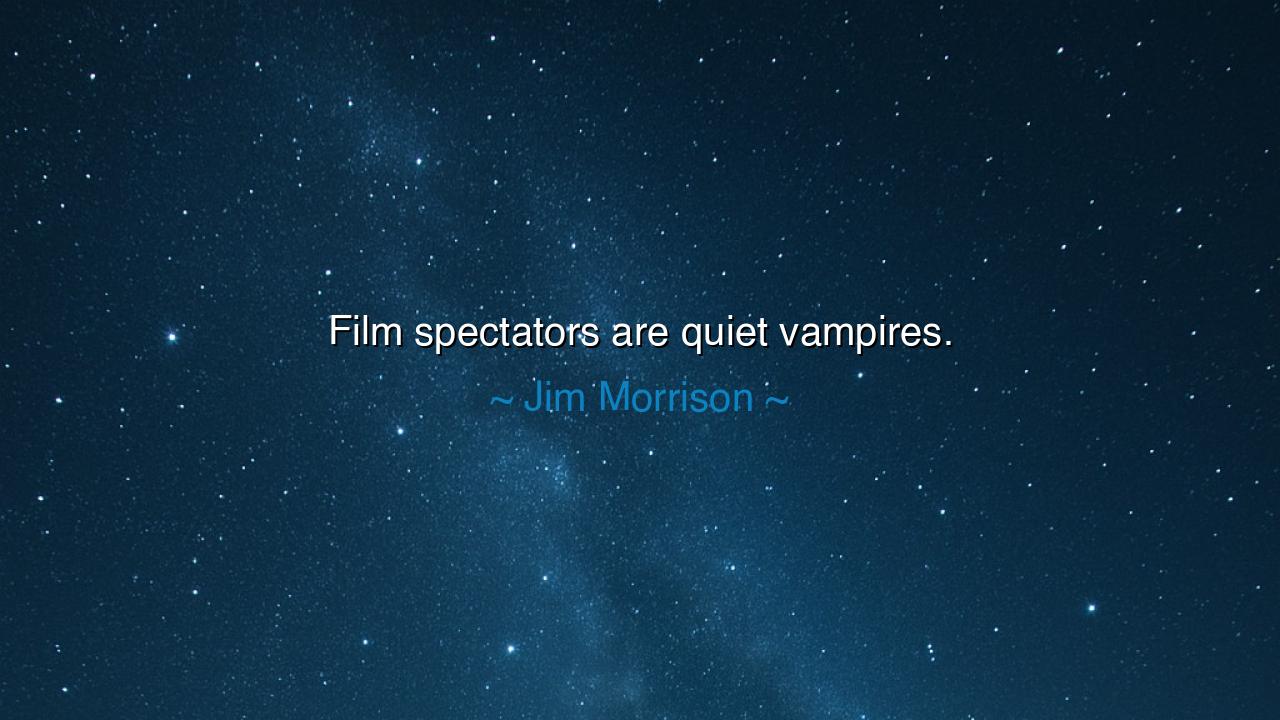
Film spectators are quiet vampires.






"Film spectators are quiet vampires." These words from Jim Morrison carry a profound and somewhat unsettling truth about the nature of modern entertainment and our relationship with it. By likening film spectators to vampires, Morrison is making a stark comparison, drawing attention to the passivity with which audiences consume the stories unfolding on the screen. A vampire, in myth, is a creature that feeds off the vitality of others—siphoning their energy and life force without giving anything in return. Similarly, film spectators often consume media, experiencing the emotions and journeys of the characters, but rarely reflecting or engaging in a way that adds to their own growth or enriches their lives. Instead, they absorb the energy and creativity of the filmmakers, without giving back in any meaningful way.
This observation taps into a larger cultural critique of entertainment, one that has existed for centuries. The ancient Greeks believed in the power of theater not just as entertainment but as a medium for moral reflection and personal growth. Aristotle, in his Poetics, posited that tragedy should evoke pity and fear, but ultimately lead to a catharsis, a purging of emotions that left the viewer changed. Theater, at its best, was meant to be an active experience—an exchange between the audience and the performance, where the spectator learned and was transformed. In contrast, Morrison's metaphor points out that much of modern cinema and media has lost this dynamic. Spectators, passively absorbing the content without any deeper engagement, often leave the theater unchanged.
The comparison to vampires is not just a critique of the passivity of the audience, but also a commentary on consumption. Just as vampires drain the life from their victims, spectators of film often engage with entertainment in a way that is mindless and unreflective. They may watch film after film, season after season, but do not allow themselves to grow or transform from the experience. The essence of creativity and art lies in its ability to provoke, to challenge the audience to confront themselves, their values, and their understanding of the world. In ancient times, art—whether in the form of theater, music, or poetry—was seen as a means to elevate the soul, not just provide fleeting pleasure. Morrison’s words serve as a reminder that film, like all forms of art, should be a dialogue, not a one-sided consumption.
Take, for example, Socrates, who believed that true wisdom came not from the mere acceptance of ideas but from the active engagement and questioning of them. Socrates famously stated that the unexamined life is not worth living, implying that humans must actively reflect on their experiences, their knowledge, and their beliefs to grow as individuals. Similarly, film spectatorship should not be about passively consuming stories but about reflecting on the themes, characters, and ideas presented. Films, like any form of art, offer a mirror through which we see the world and ourselves. To truly engage with a film, one must not only watch but reflect, learn, and apply the lessons to their own lives.
Consider the impact of Bertolt Brecht, the great German playwright and theorist. Brecht believed in a form of theater that would alienate the audience from their typical emotional involvement, forcing them to think critically about the events on stage. He wanted his audience to reflect on the social and political issues he presented, not simply to be entertained. In much the same way, Jim Morrison’s critique suggests that contemporary film often fails to challenge audiences in a meaningful way. Instead of encouraging critical thought or reflection, many films simply offer a sensory experience, a distraction from the real world, much like a vampire’s hypnotic influence over its victims. Morrison’s metaphor is a call to return to the idea of art as a transformative force, rather than mere entertainment.
The lesson in Morrison's quote is clear: we must be mindful of how we engage with the world of film and media. While entertainment has its place, it should not be a passive escape. Films, like all art, should invite us to question, to learn, and to grow. If we simply consume content without thought or reflection, we run the risk of becoming numb, like the quiet vampires Morrison describes—taking in the stories and emotions of others but never giving anything back in terms of our own growth or understanding. True engagement with art requires us to participate, to reflect, and to transform.
In practical terms, this means that when we watch a film, we should not merely sit back and enjoy the spectacle. Instead, we should ask ourselves: What questions does this story raise? What themes resonate with our own lives? How does this film challenge our perspectives? Film can be a powerful tool for self-reflection and personal transformation, but it requires us to actively participate in the experience. Rather than becoming passive consumers, we must seek to engage in the dialogue that films offer, allowing them to enrich our lives and shape our understanding of the world. Through this active engagement, we can break free from the vampiric nature of passive consumption and embrace the true power of art to elevate and transform us.






AAdministratorAdministrator
Welcome, honored guests. Please leave a comment, we will respond soon